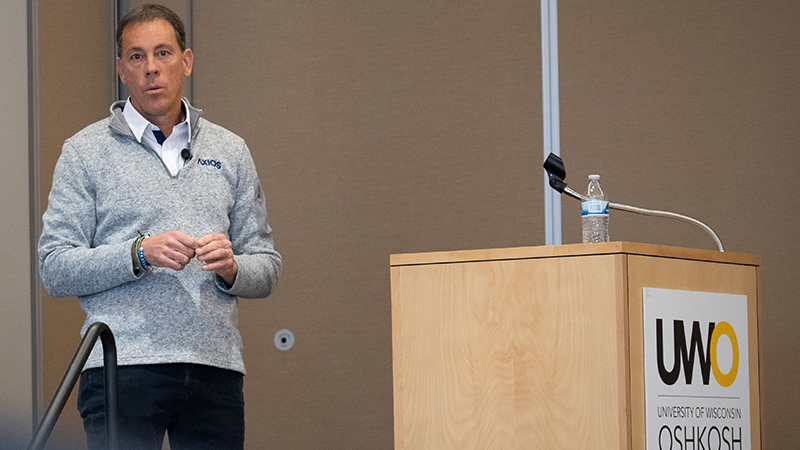Higher education talks about change, we research new ideas, we educate ourselves on new technologies and innovation, yet when it comes to putting those changes into practice we sometimes drag our feet. We need a change on change.
I had the good fortune recently to hear UWO alum Jim VandeHei (pictured above) talk about his journey from Oshkosh to co-founder of one of the most successful disruptors in journalism, Politico, and now Axios. He also talked about the growing influence of artificial intelligence. I’m still inspired by his presentation more than a month later, pondering how we can do as he did: embrace change, become disruptors.
The very term AI can strike fear. Is AI going to replace me? Who hasn’t taken a look at their job and wondered if a computer would be able to do it better. (Is AI writing this blog right now?… It’s not). We’ve seen robots revolutionize manufacturing. Why wouldn’t we embrace and worry at the same time that AI may replace at least parts of our ways of working and living?
Jim recognized early on the world of journalism was changing and he built an approach to not only manage but drive success. As we move toward implementing our UWO strategic plan, we need to be just as disruptive and nimble in our world. We need to think radically different, to not only embrace change, but use it as a guide so we can stay ahead of change, proactively managing and thriving rather than reacting.
I’ve said this so many times, but there is good reason. Our message within UWO and our message carried to local communities has to be: What kind of university does our region need and deserve? How do we best position ourselves for change, for the future? How do we meet the changing needs of students? How do we deliver courses to meet those needs? And how do we evaluate our programs, adapt our programs, develop programs to meet those needs?
It’s a tall order. Our strategic plan is just one place to start. It’s why instead of just adopting a plan and updating it annually, we will convene an inclusive committee − a team − to ensure we are advancing the strategies, the goals and the values of that plan. And then we’ll look hard at our results every year and make changes to remain in step with the needs of our stakeholders.
As our futures become more unpredictable, more volatile, it is more important than ever to have a university in your backyard that drives change and moves us into the future.
It’s a long road ahead, and it’s full of potholes that will threaten to break us down or throw us off course, but we must move forward. I’ll start with three things UWO must do:
- Draw on the expertise of our faculty to aggressively drive innovation and develop solutions.
- Instill creativity and drive entrepreneurship. It isn’t easy to keep up with the latest technology, especially as it is deployed in the classroom. But we must, and we must simultaneously hone what makes us human − imagination, empathy and the ability to see and leap beyond technology’s advancements. Our students deserve this.
- And lastly, lean into the future. AI is not going to replace any of us, but innovation moves us forward, improves our lives. UWO must be the leader in this and other change.
If the change starts with us, if we build a university and an educational experience filled with 21st century innovation, UWO will help provide all of us with the future we deserve.
![]()

